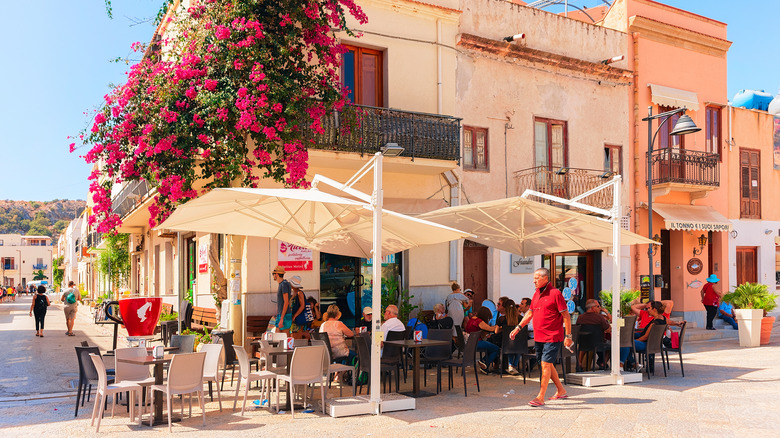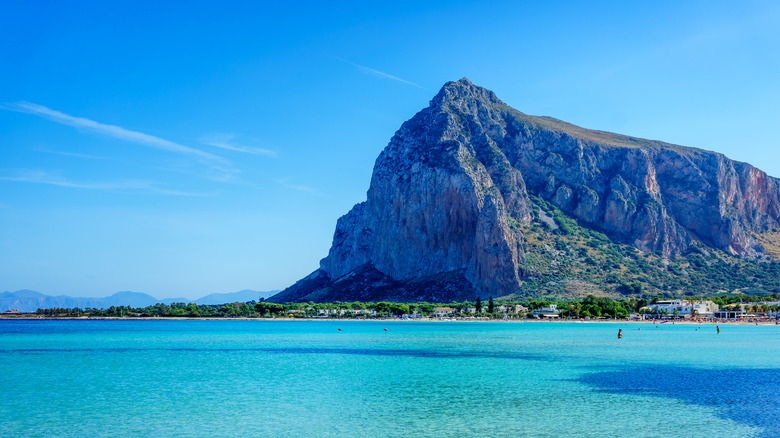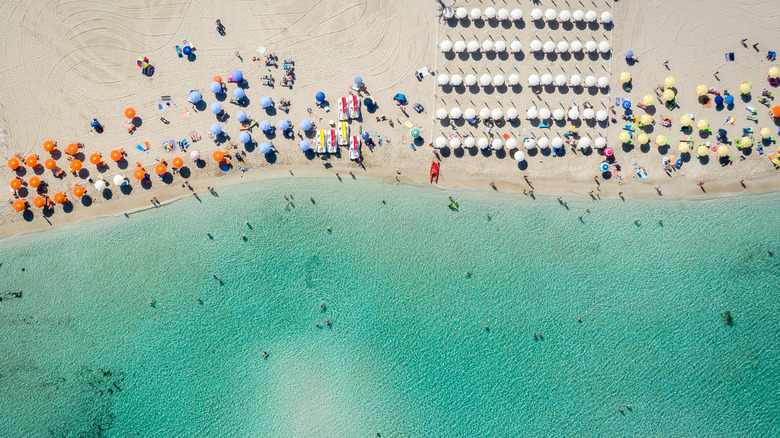San Vito Lo Capo, a serene coastal town, is a gem hidden in the Mediterranean’s embrace. It is located two hours away from Palermo on the northwestern tip of Sicily, in a small peninsula that opens into the Tyrrhenian Sea. Known for its breathtaking landscapes and one of the best beaches in Italy, this quaint destination with only 5,000 residents is a haven for travelers seeking tranquility and adventure.
The crown jewel of San Vito Lo Capo is undoubtedly its stunning beach. Stretching for 1.8 miles along the coast with its fine, white sands and crystalline turquoise waters, it offers a postcard-perfect setting. The beach is a haven for swimmers, sunbathers (or “arripudduti,” Sicilian for “wrinkly people” who spend hours at the beach, slathered in sunscreen), and families — tourists and locals alike. The shallow, calm waters of San Vito Beach are ideal for children and less confident swimmers, while the cleanliness and quality of the beach have earned it numerous accolades, including the prestigious Blue Flag award. If you want to catch a prime spot, arrive by 9 a.m. at the latest. The beach has free and private (paid) zones; renting an umbrella and a lounger will cost between €15 and €20.
If you wish to explore the sea, snorkeling, diving, and activities such as SUP are all readily available. Catamaran excursions or boat rentals with Nautical Service or Buena Vida are other fantastic options. More nearby beaches worth visiting include Isuledda Beach, Santa Margherita Bay, and Macari Beach.
Cuisine, couscous, and culture: San Vito Lo Capo

If you love seafood, you’ll love San Vito Lo Capo. The town’s restaurants and cafes serve a variety of fresh, locally sourced seafood cooked to perfection — from octopus to paranza, capone to tuna sausages. Trying local delicacies is a must in Italy, and here they include pane cunzato (seasoned bread), arancine, cannoli, and Sicilian cassata. Michelin-selected restaurants such as Gna’ Sara, Mirko’s, and Osteria il Moro are fantastic lunch or dinner options.
Couscous is synonymous with San Vito Lo Capo — so much so that they have an entire festival dedicated to the humble and delicious durum semolina! Cous Cous Fest, an annual event held in the last week of September, celebrates this local specialty that embodies the blend of cultures in Sicily. The festival attracts chefs from various countries and offers ticketholders couscous tastings, wine pairings, and even participation in the jury. Tickets range from €10 to €30. All the concerts and other fun programs of the festival are free.
San Vito Lo Capo has plenty of cultural and historical draws, and the town’s architecture, with its whitewashed buildings and narrow streets, is reminiscent of its Arabic and Norman past. A key historical site is the Sanctuary of Saint Vito, a church that dates back to the 15th century. Check out the 125-foot-tall San Vito Lo Capo Lighthouse, which has been standing since 1859, or explore the ruins of the 15th-century Tonnara del Secco, a tuna factory that was abandoned in 1965.
Nature adventure and more travel tips

Beyond beaches and cultural exploration, the town is surrounded by majestic cliffs and rugged landscapes, making it a top-ranked destination for rock climbers. The Monte Monaco and Monte Cofano have over 1,200 climbing routes catering to various skill levels, from 2A to 9A. Hikers and nature enthusiasts can explore the trails and enjoy views of the coast and the town below.
San Vito Lo Capo’s location makes it a perfect base for seeing nearby attractions. The Zingaro Nature Reserve offers six pristine beaches, trails up Mount Etna, and abundant wildlife — it’s also Sicily’s first nature reserve. Monte Cofano Reserve and the nearby Mangiapane caves are other worthwhile stops. Erice, a medieval town, and the historic city of Trapani are also within reach. San Vito Lo Capo caters to a range of preferences for accommodations — from luxury resorts like Villaggio Cala Mancina to charming bed and breakfasts like Le Tartarughe. Many places offer stunning sea views and easy access to the beach, ensuring a comfortable and memorable stay.
To reach San Vito Lo Capo, fly to Palermo or Trapani airports in Sicily. Renting a car is the best way to go from here, and it also offers the freedom to explore the area. The drive from Palermo takes around two hours, and from Trapani, around one hour. Taking public transport isn’t recommended, as there are no straightforward routes. An alternative would be taking a direct shuttle service with The Russo Company for €9.50.

